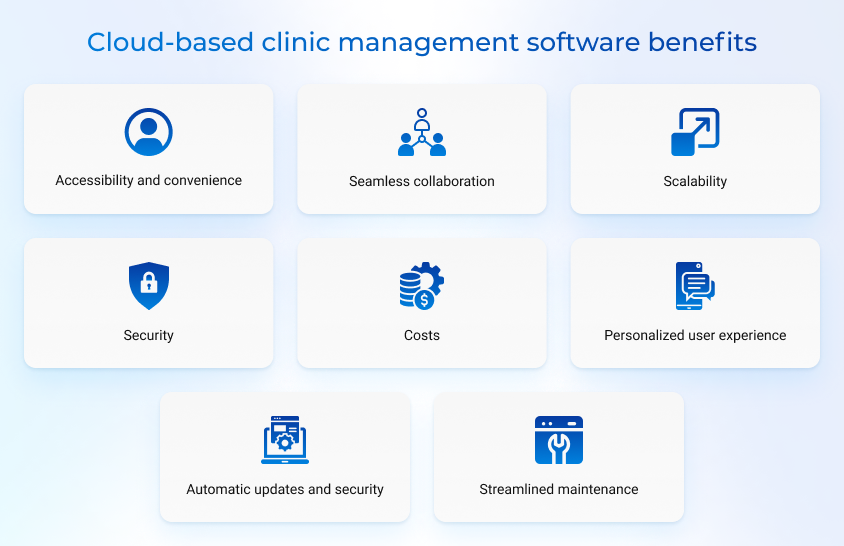
How do clinics approach managing hospital operations? Why has cloud-based clinic management software gained in popularity? What benefits can health facilities get with this HMS type? Discover details to answer these questions and learn more about cloud-based hospital management systems.
List of the Content
- What is cloud-based clinic management software?
- On-premise vs cloud-based hospital management system
- Benefits of a cloud-based clinic management system
- Conclusion
WHAT IS CLOUD-BASED CLINIC MANAGEMENT SOFTWARE
Cloud adoption has become increasingly vital to expanding the efficiency of hospital operations, data security, and overall user experience. The healthcare cloud computing market is expected to reach $120.6 billion by 2029. This significant increase is explained by the great variety of benefits for the healthcare industry, including better data storage, scalability, and flexibility.
So, let’s find out what makes a cloud-based hospital management system demanded among clinics of various specifications. The first thing to start with is to provide a definition to understand the core idea behind this HMS type.
A cloud-based clinic management system is software that helps hospitals manage their operations online. Instead of using software installed on local computers, everything is stored on the cloud. This means clinic staff can access patient records, appointments, and diagnostic information from any device with an internet connection. It makes managing the clinic easier and more flexible. The system is also scalable and gets updates automatically, so the administration doesn’t need to worry about manual updates or maintenance on their side.
ON-PREMISE VS CLOUD-BASED CLINIC MANAGEMENT SYSTEM
The fundamental difference between cloud and on-premise solutions lies in their location. On-premise systems are installed locally on the hospital’s computers and servers, while cloud-based clinic management software is hosted on the provider’s servers and accessed through a web browser.
Accessibility is definitely the thing that can make a difference for many teams. Cloud-based HMS are accessible from various devices with an internet connection, whether a computer, phone, or tablet. It means clinic staff can access patient records, manage appointments, and perform other tasks remotely, providing greater flexibility and convenience. They can work from home, at different clinic locations, or even while on the go to enhance productivity.
In contrast, on-premise systems are confined to devices within the clinic’s physical location. This restricts access to the system to the clinic’s premises and necessitates on-site equipment. Staff are unable to access the system remotely, which can impose limitations, particularly in situations requiring remote work or access.
Furthermore, cloud-based HMS solutions offer superior flexibility, with the vendor managing maintenance, updates, and security, thereby reducing the need for internal resources. Cloud systems scale effortlessly with the clinic’s growth, while on-premise systems may necessitate costly hardware upgrades. Ultimately, the choice between the two depends on your clinic’s specific needs, budget, and long-term goals.
Are you looking for sophisticated cloud-based hospital management software?
Use the trial period to experience the functionality of our cloud-based HMS system and find out how it can benefit both your public and private hospital needs.
BENEFITS OF CLOUD-BASED HOSPITAL MANAGEMENT SOFTWARE
It goes without saying that cloud-based systems have transformed how healthcare organizations can handle daily operations, patient records, and administrative tasks. Exceptional adaptability allows hospitals to efficiently manage everything from scheduling and billing to medical records. As healthcare demands continue to grow, cloud-based hospital management software will provide a centralized platform that supports both clinical and operational needs.
It’s easy to explain the widespread adoption as these solutions simplify complex workflows and integrate various departments into a single, unified system. Regardless of the size or specification, healthcare providers can find ways to improve patient care and meet evolving industry demands. The main benefits of a cloud-based hospital management system cover the following aspects.
Accessibility and convenience
It has brought the unique opportunity to access the HMS from any device with an internet connection. That means healthcare professionals can handle a variety of immediate tasks, increasing convenience for users across different roles, such as doctors, nurses, and reception staff.
Seamless collaboration
The cloud enables real-time updates and sharing of patient data between departments for better teamwork and communication. For example, lab results can be instantly available to doctors, while nurses can update patient information directly into the system; thus, everyone has the most current data.
Scalability
Unlike on-premise systems, cloud-based HMS solutions can quickly scale to accommodate the rising needs of a healthcare facility. As the number of users and patients increases, the platform can expand without requiring additional infrastructure, providing a smoother experience for both staff and patients.
Security
Cloud providers invest heavily in high-level security measures, often employing advanced encryption, multi-factor authentication, and continuous monitoring to safeguard sensitive healthcare data. They are equipped with dedicated teams of cybersecurity experts who ensure that systems are up-to-date with the latest security protocols and compliance standards, such as HIPAA or GDPR.
Personalized user experience
Cloud HMS systems commonly go with customizable dashboards and workflows tailored to different user roles. Intuitive interfaces help reduce the learning curve and improve adoption among users. They have all the required tools to navigate staff tasks and see relevant information to streamline specific procedure completion.
Costs
Cloud systems typically have lower upfront costs due to their subscription-based model, making them a more affordable option for healthcare facilities, especially smaller clinics with limited budgets. Instead of investing heavily in expensive servers, hardware, and software licenses as required by on-premise systems, cloud-based HMS allows clinics to pay only for the services they use on a flexible, monthly, or annual basis.
Automatic updates and security
This system type works great for automatic software updates and security patches without disrupting the user experience. The important thing is that the cloud-based HMS stays up-to-date with the required features and security measures, reducing downtime and maintaining system reliability.
Streamlined maintenance
It’s essential that the HMS provider takes full responsibility for system maintenance, including performance optimizations. They support the system functionality to run smoothly without disruptions. This approach frees clinics from the need to cover this vital aspect on their side.
The primary focus on accessibility, ease of use, and security makes cloud-based hospital management software significantly a better choice compared to traditional on-premise solutions.
CONCLUSION
Cloud HMS systems are well-positioned to meet the demands of both small clinics and large hospitals, paving the way for more streamlined and patient-centered healthcare delivery. Their ability to reduce upfront costs, offer remote accessibility, and automatically update with the latest features ensures that healthcare facilities stay ahead in a rapidly evolving industry. These systems support seamless collaboration among medical staff, improve patient care and administrative workflows, and deliver robust security and compliance with global healthcare standards.
FAQs
What is cloud-based hospital management software?
Cloud-based hospital management software is a web-based system that helps healthcare facilities manage their operations, including patient records, scheduling, and reporting, without needing on-premise servers.
What are the benefits of cloud-based hospital management software over traditional on-premise systems?
Cloud-based solutions offer great scalability, lower upfront costs, remote accessibility, automatic updates, and reduced IT infrastructure management, making them more convenient and cost-effective for hospitals of all sizes.
Is cloud-based hospital management software secure?
Yes, reputable cloud-based hospital management systems use advanced encryption protocols and multi-factor authentication and comply with global healthcare regulations like HIPAA or GDPR to ensure that patient data is secure and private.


